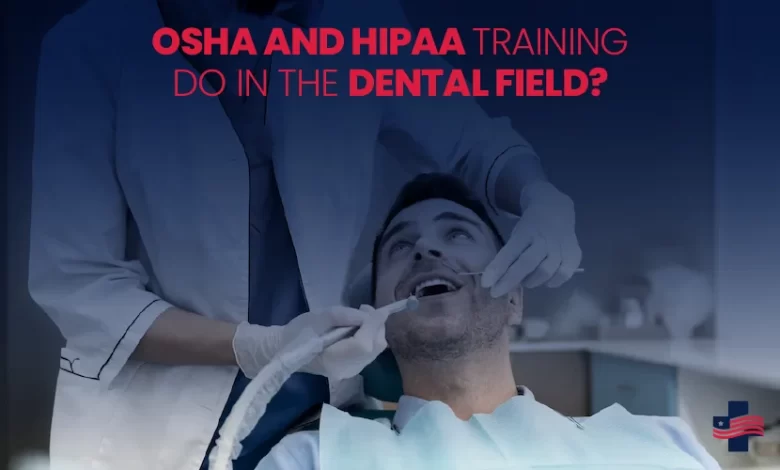
What Does OSHA and HIPAA Training Do in the Dental Field?
Creating and maintaining a thriving dental practice is no small feat. From attracting and retaining patients to managing an efficient staff and staying informed about the latest industry trends, it requires continuous effort. Amidst all these demands, there’s yet another crucial aspect to consider: keeping your dental office compliant with the regulations set forth by HIPAA and OSHA. These two acronyms, often heard in the healthcare realm, play an indispensable role in ensuring patient safety, privacy, and overall well-being within dental practices.
The Role of OSHA and HIPAA Training
HIPAA Training for Dental Offices: HIPAA, or the Health Insurance Portability and Accountability Act, lays down the guidelines to safeguard patients’ protected health information (PHI).
OSHA Training for Dental Offices: The Occupational Safety and Health Administration (OSHA) are responsible for making sure that workers are safe and healthy. Even though OSHA is mostly concerned with safety, it is reasonable for disease control. Some OSHA safety topics that have a direct effect on dental infection control are work practice control, engineering control, and personal protective equipment. In a similar way, the rules that are meant to protect the dental health care worker often make the dental customer safer as well. OSHA needs workers to get the right training to make sure they are safe.
How to simplify the compliance conundrum:( OSHA and HIPAA Training)
Navigating the intricate landscape of HIPAA and OSHA compliance can be challenging. Yet, ensuring compliance is not just a legal obligation it’s a commitment to patient care and staff safety. Here are five key reminders to help dental practices navigate this compliance journey seamlessly:
Annual Training for All Employees: Both HIPAA and OSHA require annual training for employees. HIPAA necessitates that employees are kept up-to-date with the latest privacy and security protocols. OSHA mandates comprehensive training to prevent workplace hazards and ensure safety.
Tailored Training for Specific Roles: OSHA and HIPAA training must be tailored to different roles within the dental practice. From dentists to administrative staff, every individual has a role in maintaining compliance.
Documenting Training Efforts: Just like showing your work in a math problem, documenting training is crucial. HIPAA and OSHA both emphasize the importance of keeping records of training sessions and their attendees.
Understanding the Consequences of Non-Compliance: Failure to comply with OSHA and HIPAA regulations can lead to fines and legal consequences. OSHA citations can range from moderate to severe, while HIPAA violations can result in substantial penalties.
Citations and Violations: Understanding common citations and violations helps practices focus on areas that need attention. OSHA violations may include inadequate hazard communication plans, while HIPAA violations might involve failing to perform comprehensive risk analyses.
Final Thoughts:
Navigating the complexities of managing a successful dental practice is no small task. Compliance with HIPAA and OSHA regulations adds another layer of responsibility. However, it’s about prioritizing patient safety and staff well-being.
HIPAA and OSHA training are essential components. HIPAA ensures patient information security, while OSHA focuses on a safe workplace. Annual training, tailored to roles and proper documentation are vital.
Non-compliance carries serious consequences, from fines to reputational damage. By understanding common pitfalls, you’re better equipped to avoid them.
American Healthcare Compliance is here to help. Our training elevates knowledge and ensures compliance.
Now is the time to enroll and take the first step towards a compliant and secure dental practice. Click here to enroll and embark on your journey to enhanced compliance and patient safety.
“Now is the time to enroll, and by taking this first step towards a compliant and secure dental practice, you can click here to embark on your journey to enhanced compliance and patient safety.”
FAQs
Why is HIPAA training essential for dental offices?
HIPAA training ensures that dental staff members understand the guidelines for safeguarding patients’ protected health information (PHI). It equips them to handle patient data securely, from digital record-keeping to communication practices.
Is annual training mandatory for both OSHA and HIPAA?
Yes, both HIPAA and OSHA require annual training for employees. Annual training keeps dental offices updated on the latest protocols and safety measures, ensuring consistent compliance.
Who needs to undergo OSHA training in a dental practice?
OSHA mandates that all employees, including dentists, dental assistants, administrative staff, and even custodians, undergo training. Safety protocols, infection control, and hazard management are among the topics covered.
What is OSHA, and how does it relate to dental practices?
OSHA (Occupational Safety and Health Administration) sets workplace safety standards to protect employees. Dental practices must comply to ensure the safety of both staff and patients.
Why is HIPAA training essential for dental professionals?
HIPAA (Health Insurance Portability and Accountability Act) training is vital to safeguard patient data and maintain privacy and security.
Are there specific OSHA requirements for dental offices?
Yes, OSHA has specific requirements for dental offices, such as bloodborne pathogen standards and infection control guidelines.
How often should dental staff receive OSHA training?
Dental staff should receive initial training and periodic refresher training, typically annually.
What information is covered in OSHA’s Bloodborne Pathogens Standard?
OSHA’s Bloodborne Pathogens Standard covers how to handle potentially infectious materials and minimize exposure risks.
What are the consequences of non-compliance with OSHA standards?
Non-compliance can lead to fines, legal issues, and, more importantly, the risk of staff and patient safety.
Is OSHA training different for dentists and dental assistants?
OSHA training content may vary based on specific job responsibilities, but the core principles are consistent.
What are the core components of HIPAA training for dental offices?
HIPAA training covers patient privacy, security of protected health information (PHI), and procedures for handling breaches.
How can dental practices protect patient information under HIPAA?
Dental practices protect patient information by implementing strict security measures, training staff, and having policies in place.
What’s the difference between OSHA and HIPAA training?
OSHA training focuses on workplace safety, while HIPAA training emphasizes patient data privacy and security.
Is OSHA training mandatory for dental staff?
Yes, OSHA training is mandatory to ensure a safe working environment.
How can dental practices ensure infection control compliance?
Dental practices can ensure compliance by following OSHA’s infection control guidelines, which include sterilization and disinfection protocols.
Do dental hygienists require specialized OSHA training?
Dental hygienists should receive the same OSHA training as other dental staff, tailored to their specific tasks.
How can I find accredited OSHA and HIPAA training providers for dentistry?
Look for accredited providers through dental associations, online courses, or consult your state’s dental board.
What are the penalties for HIPAA violations in dental offices?
Penalties for HIPAA violations can range from fines to legal action, depending on the severity of the breach.
Can OSHA and HIPAA training be conducted online?
Yes, both OSHA and HIPAA training can be conducted online for convenience, but ensure the courses are accredited and up-to-date.
Are there state-specific regulations that dental practices need to follow?
Yes, some states may have additional regulations, so it’s essential to be aware of local requirements.
How can dental professionals stay up-to-date with changing OSHA and HIPAA requirements?
Dental professionals can stay updated through regular training and monitoring regulatory updates from authoritative sources.
What should dental employees do in the event of a workplace accident or exposure incident?
Dental employees should follow established protocols for reporting accidents or exposure incidents, which may include seeking medical attention and documenting the incident.






